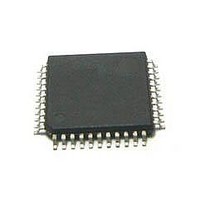MC56F8245VLD Freescale Semiconductor, MC56F8245VLD Datasheet - Page 410

MC56F8245VLD
Manufacturer Part Number
MC56F8245VLD
Description
DSC 48K FLASH 60MHZ 44-LQFP
Manufacturer
Freescale Semiconductor
Series
56F8xxxr
Datasheets
1.TWR-56F8257.pdf
(88 pages)
2.MC56F8245VLD.pdf
(14 pages)
3.MC56F8245VLD.pdf
(2 pages)
4.MC56F8245VLD.pdf
(629 pages)
Specifications of MC56F8245VLD
Core Processor
56800E
Core Size
16-Bit
Speed
60MHz
Connectivity
CAN, I²C, LIN, SCI, SPI
Peripherals
LVD, POR, PWM, WDT
Number Of I /o
35
Program Memory Size
48KB (24K x 16)
Program Memory Type
FLASH
Ram Size
3K x 16
Voltage - Supply (vcc/vdd)
3 V ~ 3.6 V
Data Converters
A/D 8x12b, D/A 1x12b
Oscillator Type
Internal
Operating Temperature
-40°C ~ 105°C
Package / Case
44-LQFP
Product
DSCs
Processor Series
56800E
Core
56800E
Device Million Instructions Per Second
60 MIPs
Maximum Clock Frequency
60 MHz
Number Of Programmable I/os
35
Data Ram Size
6 KB
Operating Supply Voltage
3.3 V
Maximum Operating Temperature
+ 105 C
Mounting Style
SMD/SMT
Minimum Operating Temperature
- 40 C
On-chip Adc
12 bit, 4 Channel
Package
44LQFP
Family Name
MC56F82xx
Maximum Speed
60 MHz
Data Bus Width
16 Bit
Interface Type
I2C/SCI/SPI
On-chip Dac
1-chx12-bit
Number Of Timers
8
Lead Free Status / RoHS Status
Lead free / RoHS Compliant
Eeprom Size
-
Lead Free Status / Rohs Status
Details
Available stocks
Company
Part Number
Manufacturer
Quantity
Price
Company:
Part Number:
MC56F8245VLD
Manufacturer:
FREESCAL
Quantity:
269
Company:
Part Number:
MC56F8245VLD
Manufacturer:
Freescale Semiconductor
Quantity:
10 000
- TWR-56F8257 PDF datasheet
- MC56F8245VLD PDF datasheet #2
- MC56F8245VLD PDF datasheet #3
- MC56F8245VLD PDF datasheet #4
- Current page: 410 of 629
- Download datasheet (4Mb)
Operating Modes
SPI operating in slave mode, the load of the shift register is controlled by the external
master, and back-to-back writes to the transmit data register are not possible. The SPTE
bit indicates when the next write can occur.
12.4.4 Error Conditions
The following flags signal SPI error conditions:
>
12.4.4.1 Overflow Error
The overflow flag (OVRF) is set if the receive data register still has unread data from a
previous transaction when the capture strobe of bit 1 of the next transaction occurs. The
bit 1 capture strobe occurs in the middle of SCLK when the data length equals transaction
data length – 1. If an overflow occurs, all data received after the overflow and before the
OVRF bit is cleared does not transfer to the receive data register and does not set the SPI
receiver full bit (SPRF). The unread data that is transferred to the receive data register
before the overflow occurred can still be read. Therefore, an overflow error always
indicates the loss of data. Clear the overflow flag by reading the SPI status and control
register and then reading the SPI data register.
OVRF generates a receiver/error DSC interrupt request if the error interrupt enable bit
(ERRIE) is also set. It is not possible to enable MODF or OVRF individually to generate
a receiver/error DSC interrupt request. However, leaving MODFEN low prevents MODF
from being set.
If the DSC SPRF interrupt is enabled and the OVRF interrupt is not, watch for an
overflow condition. The following figure shows how it is possible to miss an overflow.
The first part of the figure shows how it is possible to read the SCTRL register and the
DRCV register to clear the SPRF without problems. However, as illustrated by the
second transaction example, the OVRF bit can be set in between the time that the SCTRL
register and the DRCV register are read.
410
• Overflow (OVRF) — Failing to read the DRCV register before the next data word
• Mode fault error (MODF) — The MODF bit indicates that the voltage on the slave
completes entering the shift register sets the OVRF bit. The new data word does not
transfer to the receive data register, and the unread data word can still be read. OVRF
is in the SPI status and control register.
select pin (SS) is inconsistent with the mode of the SPI. MODF is in the SPI status
and control register.
MC56F825x/4x Reference Manual, Rev. 2, 10/2010
Preliminary
Freescale Semiconductor
Related parts for MC56F8245VLD
Image
Part Number
Description
Manufacturer
Datasheet
Request
R
Part Number:
Description:
Manufacturer:
Freescale Semiconductor, Inc
Datasheet:
Part Number:
Description:
Manufacturer:
Freescale Semiconductor, Inc
Datasheet:
Part Number:
Description:
Manufacturer:
Freescale Semiconductor, Inc
Datasheet:
Part Number:
Description:
Manufacturer:
Freescale Semiconductor, Inc
Datasheet:
Part Number:
Description:
Manufacturer:
Freescale Semiconductor, Inc
Datasheet:
Part Number:
Description:
Manufacturer:
Freescale Semiconductor, Inc
Datasheet:
Part Number:
Description:
Manufacturer:
Freescale Semiconductor, Inc
Datasheet:
Part Number:
Description:
Manufacturer:
Freescale Semiconductor, Inc
Datasheet:
Part Number:
Description:
Manufacturer:
Freescale Semiconductor, Inc
Datasheet:
Part Number:
Description:
Manufacturer:
Freescale Semiconductor, Inc
Datasheet:
Part Number:
Description:
Manufacturer:
Freescale Semiconductor, Inc
Datasheet:
Part Number:
Description:
Manufacturer:
Freescale Semiconductor, Inc
Datasheet:
Part Number:
Description:
Manufacturer:
Freescale Semiconductor, Inc
Datasheet:
Part Number:
Description:
Manufacturer:
Freescale Semiconductor, Inc
Datasheet:
Part Number:
Description:
Manufacturer:
Freescale Semiconductor, Inc
Datasheet:











